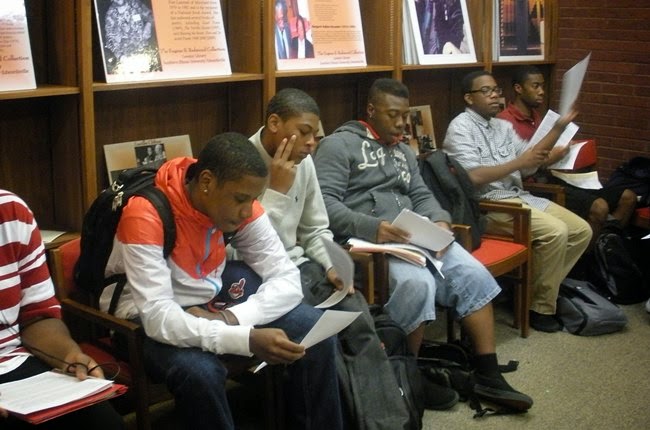 |
| Group of the guys from the program talking, 2010 |
Reading autobiographical writings and biographical studies of Frederick Douglass, Langston Hughes, Richard Wright, Ralph Ellison, John Coltrane, Malcolm X, Amiri Baraka, and Barack Obama, to name a few, over the years inclined me to think about the childhoods of these prominent black men. In addition to viewing them as notable historical and political figures, my readings led me to consider their lives as black boys.
Early on, I discovered Wright and his autobiography, Black Boy. Just as important, I fortuitously landed at an undergraduate institution that happened to employ an important Wright Scholar, Jerry W. Ward, Jr., who in turn introduced me to a broad, Wright Critical Paradigm. Unknowingly, I was developing a useful blueprint.
 |
| Student at our annual visit to the National Underground Railroad Freedom Center in Cincinnati, Ohio 2008 |
If you studied Wright while living in Mississippi, as I was at the time, you inevitably posed a question: How did his experiences as a black boy shape his thinking? You might then be predisposed to raise that question concerning other black men that you studied or encountered along your travels.
Over the last several years, I’ve read works by and about Colson Whitehead, Ta-Nehisi Coates, Kevin Young, Jay Z, and others. I began wondering about their early developments as thinkers and then writers. At times, for each one, I’ve returned to versions of my Wright question: How did his experiences as a black boy shape his thinking?
 |
| A group of the "older" guys from the program talking music, 2010 |
As juniors and seniors, the “old” guys stop by my office all the time and reflect on their “young days” way back when they were first-year students. “I don’t know what I was thinking back then,” those 21-year-olds repeatedly tell me as they reference questionable behavior from when they were 18 and 19 years old.
 |
| Students from the program in the Underground Reading Room, Fall 2011 |
If thinking about childhoods of prominent black men has assisted me in my considerations of the young guys I work with at SIUE, then it’s also true that my work with these collegiate black men also nurtured and increased my interest in the youthful musings and developments of those established black men. The college guys are frequently talking about their ideas, artistic interests, and thought processes when they were black boys. Taken together, they’ve provided me with a wealth of knowledge that drives some of my curiosities about the writers I study.
Related:
• Black Intellectual Histories
• Collegiate Students

No comments:
Post a Comment